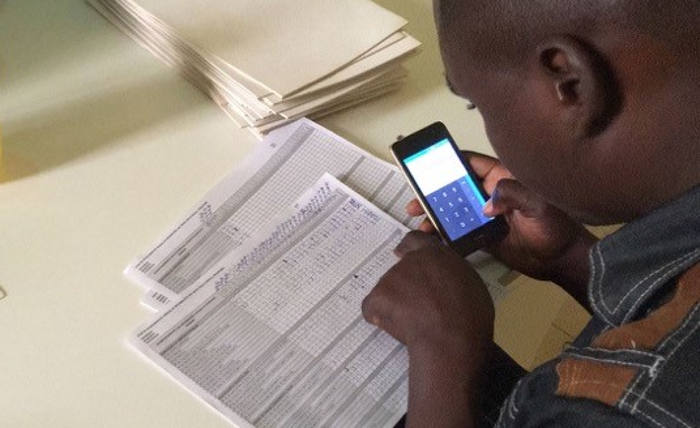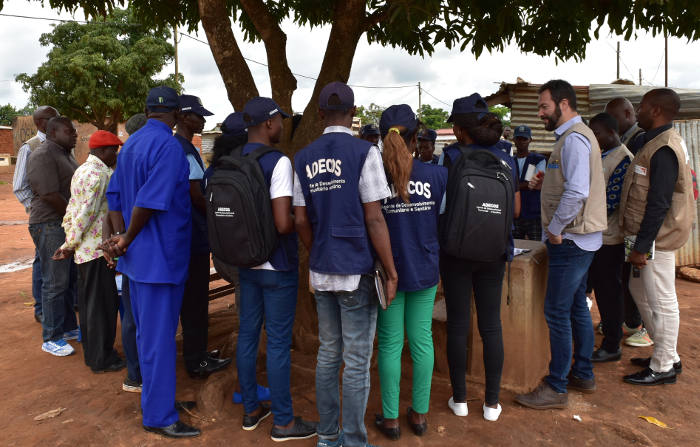-
|
24 May 2018
|Posteado en : Opinion
We recognize the actions of the project that contribute to local development in the country and improve the situation of Angolan municipalities
Wednesday, 5 March 2030, 38 degrees in the shade, the electricity is on and the thermostat is set at 23 degrees (it’s been some time since there were power cuts).
– Good morning, Minister. We have a few problems: someone has been trying to hack the family information network, although they didn’t succeed. We have to try to increase security. If not, we’ll have problems with the privacy of information act.
-But… Did they manage to get in and copy any information?
-No, the firewall the Spanish installed for us a short time ago prevented it, but not without problems.
-By the way, Joao, I’m seeing that in Cuando-Cubango the maps are showing in light yellow that 3 micro-areas between Cuito Cuanavale and Mavinga are on the alert for dengue fever, but there’s one in the middle that’s not marked…
-Let me see… Yes, it doesn’t seem logical; I’ll go and see what’s happening and let you know.
Joao Mungamba goes to see what’s happening with the family record information system that is part of the municipal information systems.
-Minister, I talked to the Department in Menongue and it seems that the ADECOS in that micro-area didn’t manage to enter the information from their mobile phones because of a connectivity problem, but it’s already been solved and we’ll have up-to-date information shortly. They also informed me that there are mosquitoes in that micro-area, so that, when they update the information, it will also be on pre-alert. I saw on the system that a fumigation team had problems with the sprayer but that’s been solved and now they’re spraying in Longa.
This is what we imagine today the situation could be llike in Angola in 2030, thanks to the work being done since 2015 by FIIAPP and the Social Aid Fund (FAS), to implement the project “Support for the Local Development Programme”, financed by the European Union.
Angolan municipalities, in real time
As part of this project, FIAPP is assisting with a new method of municipal profiling, which, thanks to the addition of new technologies, is becoming dynamic. In other words, it is changing as the municipality grows. This process has helped to empower the local authorities.
Municipal profiles are no longer static photos of the situation in the area that quickly became obsolete. With this new methodology, the snapshot of the municipality is updated in real time each time that a new piece of information is collected, which helps the Angolan local authorities to adjust their plans and make informed decisions.

But, how does it work? The process for creating dynamic municipal profiles consists of municipal technicians entering information into a database using mobile apps during their field visits. This permits geo-referenced and photographic data to be collected, which is constantly updated according to the different changes in the municipality.
Using this information, the data are analysed and tables and graphics produced containing specific information for the different sectors: education, healthcare, basic sanitation, etc. This makes it easier to draw maps automatically. From these renderings, grouped by sector and by commune (a political and administrative division of Angolan municipalities), the municipalities aided by the project have created their municipal profiles.
The advantage of this method is not only that it is dynamic but that it also makes a contribution to the endogenous development of the municipalities, as the information is collected, generated and stored locally. It forms an important basis for the development of the country’s municipalities (the first municipal elections are planned for 2020).
To complement the process, the project has contributed to the development of a Basic Municipal Information System (SIBM), a web-based tool that allows access to the municipal database from anywhere in the world and provides information on the municipality by sector.
This tool allows the Angolan Ministry of Territorial Administration and State Reform (MATRE) to have immediate access to up-to-date information on the situation in the municipalities, helping it to make decisions and design public policies based on the real needs of the municipalities.
ADECOS as community spokespersons
In parallel, the project is implementing a pilot phase of the National Community and Sanitation Development Agents Programme (ADECOS). The ADECOS serve as a communication link between the community and the local authorities for basic services designed to promote social inclusion and active citizenship. They are responsible for promoting the development of the community and of the households in their area of operation by working with the families and community leaders on a daily basis.

Supervised by MATRE and the Ministry of Health and coordinated by FAS in conjunction with the provincial governments and municipal authorities, each ADECO is responsible for recording and following up on 30 families in a micro-area each month. This pilot phase, which is financed by the project, involves 670 ADECOS and benefits a population of over 130,000 people in 18 municipalities in 6 provinces in Angola. Currently, the information is collected manually but work is being done on collecting it digitally and entering it in the municipal database in order to draw up a dynamic municipal profile.
The ADECOS programme seeks to be successful and to become an international reference model, especially for the African continent. As it is large-scale and can have a positive impact on all of society, the World Health Organisation (WHO) and UNICEF are highlighting and recommending Community Development Agents as one of the most effective strategies for promoting basic social actions.
The work done at the municipal level could lead to the computerisation of much of the data that only exists on paper, making it easier to process it, improving its quality and permitting its dissemination, so that it can become the monitoring and planning tool in the fictional dialogue at the beginning of this report. Ultimately, it will allow local, provincial and national authorities to produce plans based on better information to benefit the people of Angola.
Jaime Lodeiros, Nuria Garriga, Vagno Gomes and Aran Palau. The FIIAPP team in Angola




